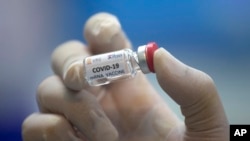African leaders and health experts have called for equitable and fair access to any approved vaccine against the coronavirus. As the number of confirmed COVID-19 cases in Africa has surpassed 300,000, governments across the continent are organizing themselves to manufacture any vaccine quickly.
Director-General of the World Health Organization Tedros Adhanom Ghebreyesus said Wednesday that a huge investment was needed for any approved COVID-19 vaccine to be quickly made available throughout Africa.
“Only one virus in history has been eradicated. It’s likely that COVID-19 will be with us for the foreseeable future and we must learn to live with it. A vaccine is an essential tool for doing that,” Tedros said.
He was speaking at a conference in Addis Ababa organized by the African Union and the Africa Centers for Disease Control and Prevention (CDC).
Africa is seeing increasing numbers of confirmed infections, as testing on Tuesday became available in every country on the continent.
The WHO on Wednesday said Africa had over 321,000 confirmed infections.
African leaders and health experts attending the conference said the continent’s most vulnerable and health workers would need a vaccine soonest.
Director of the Africa CDC Dr. John Nkengasong said countries should be preparing.
"As a continent, we should be positioning ourselves to conduct clinical trials in a network fashion. We should also enable regulatory processes that would facilitate uptake of vaccines. ...We also need to secure deals through bilateral governments," Nkengasong said.
South Africa, the African country worst hit by the virus with over 100,000 confirmed infections, on Tuesday reported its highest daily death toll — 111 people — since the pandemic began.
Salim Abdool Karim, chair of the South African Ministerial Advisory Committee for COVID-19, said countries would need to deal with intellectual property issues to move quickly to manufacture a vaccine.
“Most of the companies that are developing vaccines are developing it basically with a two-fold market strategy. The first is to have a profitable market in the wealthy countries and then to have a voluntary license market in the countries that will not be able to afford purchasing the vaccine. In terms of countries that can't afford the vaccine, the voluntary licensing will enable big manufacturers in India and China to manufacture it under license, and then they would supply it to various countries,” he said.
Karim said that the world’s poorest countries would likely be covered through Gavi, a global vaccine alliance spearheaded by the United Nations and the Bill and Melinda Gates Foundation.
He said that developing countries such as South Africa would likely purchase vaccines at a fraction of the cost.
Meanwhile, African countries are responding to the pandemic, but there are gaps with providing safety equipment and inconsistent measures to stop the virus that still make the continent vulnerable.
WHO chief Tedros said the pandemic is now accelerating at an alarming rate globally.
And while it took more than three months for the virus to infect 1 million people, the last 1 million cases were reported in just one week.





